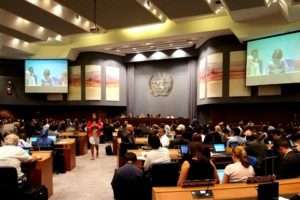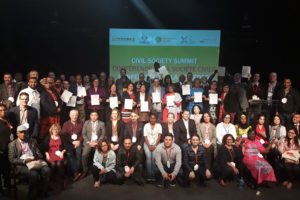IBON International Update #15 – WTO
BALI, 5 December 2013 – On the third day of the Ninth Ministerial Conference of the World Trade Organization in this resort island of Indonesia, negotiations appear headed for another failure.
Despite dire warnings and intense pressure from the United States and other major powers, there is still no consensus on the Bali trade package under discussion.
A dozen countries – including India, Cuba, Bolivia, South Africa and Argentina – criticized the Bali package for being lopsided. India’s trade minister Anand Sharma described it as “a half-baked agriculture package and statements of pious intent for least developed countries.”
At the center of the debate is whether developing countries will be allowed to spend on food stockholding programs without being challenged in the WTO’s dispute settlement mechanism. In a press conference today, the Indian trade minister said the Right to Food Security is non-negotiable. He cited supportive statements from the United Nations Rapporteur on the Right to Food Olivier de Schutter endorsing such programs as a means to protect the right to food. He also criticized other unfair and outdated provisions in the Agreement on Agriculture that was negotiated during the Uruguay Round. Responding to claims that India was alone in rejecting the compromise “Peace Clause” – a four-year reprieve from being sued – offered by the US, EU and others, Sharma said 75% of the world’s population is with India on this.
Indeed, almost all civil society organizations here condemned the US’ attempts to further undermine food sovereignty and the people’s right to food. The Asian Peasant Coalition (APC) said the US was coercing trade ministers and officials of 160 countries to accept the Bali package of the WTO to allow rich countries to further dump surplus agricultural products, export finance capital, and penetrate other profitable sections of least developed countries in the name of global capital, land grabbing and resource plunder.
But Indian activist and APC South Asia coordinator P. Chennai also chided the Indian government for pursuing what he called a bogus food security law, which he dismissed as a token measure that will not solve food insecurity and gross hunger of the Indian people.
Trade ministers from various countries including South Africa, Argentina, Namibia, Venezuela, Bolivia, and Kenya all suggest that negotiations be pursued in a post-Bali period.
On the other hand, the US trade representative warned the assembly, “Leaving Bali this week without an agreement would deal a debilitating blow to the WTO as a forum for multilateral negotiations.”
Desperate for an agreement to come out of Bali, talks are continuing into the wee hours of the morning. Under such intense pressure, there is the possibility that negotiations will be extended until the weekend.# (Paul Quintos in Bali)



